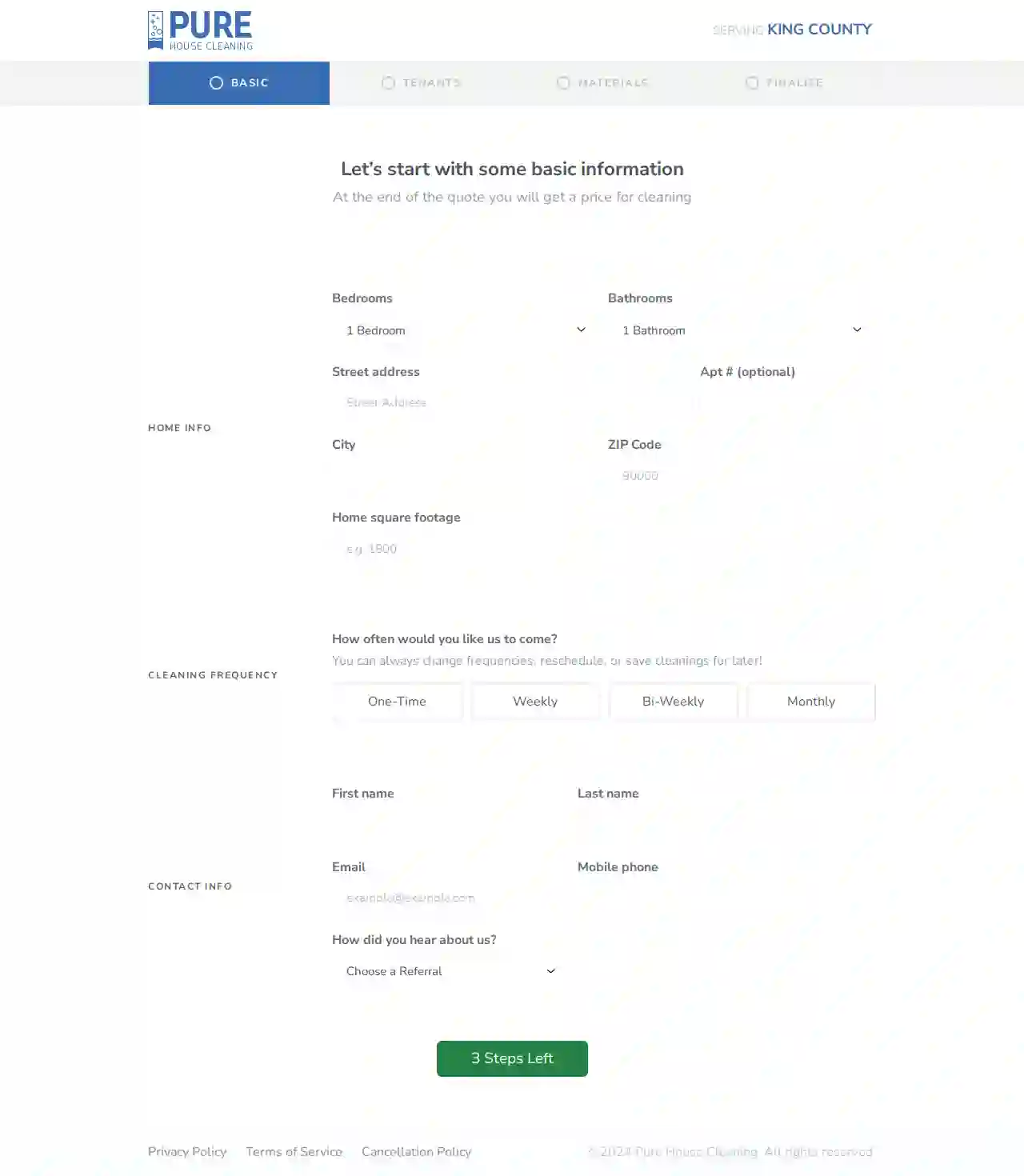Cleaning Services Rochester
Best Home Cleaning in Rochester
Receive up to 3 Home Cleaning quotes for your project today! Compare profiles, reviews, accreditations, portfolio, etc... and choose the best offer.

Pure House Cleaning
535 reviews123 Main St, Bellevue, 98004, USAt Pure House Cleaning, we understand the importance of a clean and comfortable living space. That's why we're dedicated to providing top-notch cleaning services to our clients in King County. With years of experience and a team of highly trained professionals, we're committed to delivering exceptional results that exceed your expectations. Whether you're a tenant or a homeowner, we'll work with you to create a customized cleaning plan that meets your unique needs and preferences. Contact us today to schedule your appointment and experience the Pure House Cleaning difference!
- Services
- Why Us?
- Gallery
Get Quote
Seattle Commercial Cleaners
56 reviewsSeattle, US- Services
- Why Us?
- Gallery
Get Quote
Pioneer Commercial Cleaning
512 reviewsSpokane, US- Services
- Why Us?
- Gallery
Get Quote
NW Maids House Cleaning Service of Seattle
4.3330 reviewsSeattle, US- Services
- Why Us?
- Gallery
Get Quote
Enviro-Master of Seattle
55 reviewsSeattle, US- Services
- Why Us?
- Gallery
Get Quote
Gloria's House Cleaning Service
4.531 reviewsSeattle, US- Services
- Why Us?
Get Quote
Debusk Services Group
4.412 reviewsKent, US- Services
- Why Us?
- Gallery
Get Quote
Seattle Green Earth Cleaning
518 reviewsSeattle, US- Services
- Why Us?
- Gallery
Get Quote
MOLLY MAID of Northwest Seattle
4.9356 reviewsSeattle, US- Services
- Why Us?
- Gallery
Get Quote
Clean Nation Co.
4.985 reviewsSpokane, US- Services
- Why Us?
- Gallery
Get Quote
Over 60,241+ Janitorial Services on our directory
Our cleaning service providers operate in Rochester and beyond!
CleaningMatch has curated and vetted Top Cleaning Businesses arround Rochester. Find a top & trustworthy pro today.
Frequently Asked Questions About Cleaning Services
- Regular dusting: Dust frequently using microfiber cloths or a duster. Pay attention to surfaces that attract dust, such as shelves, electronics, and furniture.
- Vacuuming: Vacuum carpets and rugs regularly using a vacuum cleaner with a HEPA filter to trap dust mites and allergens.
- Air Purifier: Consider using an air purifier to remove dust particles and allergens from the air.
- Reduce Clutter: Clutter provides more surfaces for dust to settle. Declutter regularly to minimize dust traps.
- Window Treatments: Wash or vacuum window treatments, such as curtains or blinds, regularly to remove dust buildup.
- Bedding: Wash bedding, including sheets, pillowcases, and blankets, weekly in hot water to remove dust mites.
- Doormats: Place doormats at entrances to trap dirt and dust from shoes before they enter your home.
- Floors: Use floor cleaners designed for your specific floor type, such as hardwood, tile, or laminate. Avoid using harsh cleaners that can strip finishes or cause discoloration.
- Countertops: Clean granite, marble, or quartz countertops with pH-neutral cleaners to prevent etching or damage. Use disinfecting wipes or sprays for other countertops.
- Bathrooms: Use bathroom cleaners designed to remove soap scum, mildew, and hard water stains. Avoid using abrasive cleaners on fixtures or tiles.
- Glass and Mirrors: Clean windows and mirrors with glass cleaners that leave a streak-free finish. Avoid using paper towels, which can leave lint behind.
- Appliances: Clean stainless steel appliances with specialized cleaners that prevent streaks and fingerprints. Use degreasers for ovens and stovetops.
- Using the wrong cleaning products: Certain cleaning products are unsuitable for specific surfaces. Using abrasive cleaners on delicate surfaces can cause scratches or discoloration.
- Not reading product instructions: Always read and follow the instructions on cleaning products to ensure proper usage and avoid potential hazards.
- Using dirty cleaning tools: Dirty cloths, sponges, and mops can spread germs and dirt instead of cleaning them. Rinse and sanitize your cleaning tools regularly.
- Skipping ventilation: Proper ventilation is essential when using cleaning products, especially those with strong fumes. Open windows and doors to allow fresh air circulation.
- Not allowing sufficient drying time: After cleaning, allow surfaces to dry completely to prevent mold and mildew growth, particularly in humid areas like bathrooms.
- Ignoring clutter: Clutter makes cleaning more difficult and time-consuming. Declutter regularly to maintain a cleaner and more organized home.
- Weekly: Suitable for busy households with children or pets, ensuring a consistently clean and healthy environment.
- Bi-weekly: A good option for smaller households or those who maintain a relatively clean home.
- Monthly: May be sufficient for individuals or couples who live a minimalist lifestyle.
- Quarterly or Annually: Can be suitable for deep cleaning or seasonal cleaning tasks.
How do I prevent dust from accumulating in my home?
By implementing these preventive measures, you can significantly reduce dust accumulation and maintain a cleaner and healthier home.
How do I choose the right cleaning products for different surfaces?
If you're unsure about the right cleaning product for a surface, consult the manufacturer's instructions or seek advice from a cleaning professional.
What are some common cleaning mistakes to avoid?
By avoiding these common cleaning mistakes, you can improve your cleaning efficiency and achieve better results.
How often should I have my house cleaned?
You can adjust the frequency based on your needs and budget. Some people opt for weekly cleaning for high-traffic areas like kitchens and bathrooms and bi-weekly cleaning for the rest of the house.
How do I prevent dust from accumulating in my home?
- Regular dusting: Dust frequently using microfiber cloths or a duster. Pay attention to surfaces that attract dust, such as shelves, electronics, and furniture.
- Vacuuming: Vacuum carpets and rugs regularly using a vacuum cleaner with a HEPA filter to trap dust mites and allergens.
- Air Purifier: Consider using an air purifier to remove dust particles and allergens from the air.
- Reduce Clutter: Clutter provides more surfaces for dust to settle. Declutter regularly to minimize dust traps.
- Window Treatments: Wash or vacuum window treatments, such as curtains or blinds, regularly to remove dust buildup.
- Bedding: Wash bedding, including sheets, pillowcases, and blankets, weekly in hot water to remove dust mites.
- Doormats: Place doormats at entrances to trap dirt and dust from shoes before they enter your home.
By implementing these preventive measures, you can significantly reduce dust accumulation and maintain a cleaner and healthier home.
How do I choose the right cleaning products for different surfaces?
- Floors: Use floor cleaners designed for your specific floor type, such as hardwood, tile, or laminate. Avoid using harsh cleaners that can strip finishes or cause discoloration.
- Countertops: Clean granite, marble, or quartz countertops with pH-neutral cleaners to prevent etching or damage. Use disinfecting wipes or sprays for other countertops.
- Bathrooms: Use bathroom cleaners designed to remove soap scum, mildew, and hard water stains. Avoid using abrasive cleaners on fixtures or tiles.
- Glass and Mirrors: Clean windows and mirrors with glass cleaners that leave a streak-free finish. Avoid using paper towels, which can leave lint behind.
- Appliances: Clean stainless steel appliances with specialized cleaners that prevent streaks and fingerprints. Use degreasers for ovens and stovetops.
If you're unsure about the right cleaning product for a surface, consult the manufacturer's instructions or seek advice from a cleaning professional.
What are some common cleaning mistakes to avoid?
- Using the wrong cleaning products: Certain cleaning products are unsuitable for specific surfaces. Using abrasive cleaners on delicate surfaces can cause scratches or discoloration.
- Not reading product instructions: Always read and follow the instructions on cleaning products to ensure proper usage and avoid potential hazards.
- Using dirty cleaning tools: Dirty cloths, sponges, and mops can spread germs and dirt instead of cleaning them. Rinse and sanitize your cleaning tools regularly.
- Skipping ventilation: Proper ventilation is essential when using cleaning products, especially those with strong fumes. Open windows and doors to allow fresh air circulation.
- Not allowing sufficient drying time: After cleaning, allow surfaces to dry completely to prevent mold and mildew growth, particularly in humid areas like bathrooms.
- Ignoring clutter: Clutter makes cleaning more difficult and time-consuming. Declutter regularly to maintain a cleaner and more organized home.
By avoiding these common cleaning mistakes, you can improve your cleaning efficiency and achieve better results.
How often should I have my house cleaned?
- Weekly: Suitable for busy households with children or pets, ensuring a consistently clean and healthy environment.
- Bi-weekly: A good option for smaller households or those who maintain a relatively clean home.
- Monthly: May be sufficient for individuals or couples who live a minimalist lifestyle.
- Quarterly or Annually: Can be suitable for deep cleaning or seasonal cleaning tasks.
You can adjust the frequency based on your needs and budget. Some people opt for weekly cleaning for high-traffic areas like kitchens and bathrooms and bi-weekly cleaning for the rest of the house.